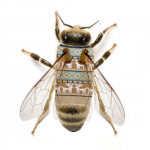Scientists have recently discovered the reason for colony collapse disorder in bees. Apparently, the cause is cold weather. Bees are particularly sensitive to the cold and tend to die in droves. This revelation has led to some interesting business opportunities.
An Oregon husband and wife team, upon reading this news have come up with a solution to the problem which helps the bees but also helps them personally. They have begun knitting tiny sweaters for bees. Kyle Connor and Sarah Reese (they legally never married), of Eugene, OR, have founded a company called Bee-Warmer!, LLC. Their stated intent is to bring back the honey.

Sweater for a bee!
Admittedly, knitting bee sweaters is a difficult task and the couple is actively looking for ways to automate the process. For now, each of them knits 20 sweaters per night which are for sale to local beekeepers. The beekeepers tend to buy a batch of sweaters for an entire hive. This is a problem due to the fact that a typical hive contains between 10,000 and 60,000 bees. It takes quite a while to get to the 30,000 sweater mark, so they’ve had to enlist their children in the manufacturing process. While the beekeepers wait, they tend to dress the most important bees. The queen, of course, gets a sweater. They also tend to dress the most productive workers first, as well. We tried to understand how they determine which bees those happen to be but the explanation involves the keeper explaining flower quotas and names of individual bees. We really didn’t have time for that.
Responsibility
To motivate their six children, they have had to resort to some creative measures. The youngest, Maria, is only five years old so they pay close attention to her work. Quality control is a large part of their business model and work performed by a five-year-old can be dodgy. To combat this, they simply don’t feed her until she gets it right. She’s very motivated by food.
According to local community college professor, Mark Jenkins, “This market segment has a lot of upside potential. As more people catch on to the possibilities we can expect big textile companies to enter the market.” One of his concerns, especially related to mom-and-pop bee-sweater manufacturing, is the potential for the market to be flooded by cheap, Chinese, mass-produced sweaters. While it would certainly undercut the family operations, there will always be a market for handmade sweaters among beekeepers who appreciate quality.







